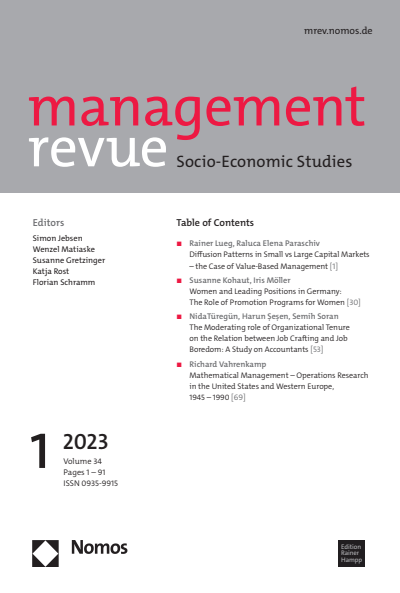技术支持的灵活工作安排对员工声音的影响:走向微妙的理解
IF 1.7
0 MANAGEMENT
引用次数: 1
摘要
通过远程办公和虚拟团队等数字技术实现的灵活工作安排,可以提高员工、团队和组织在动态和模糊的环境中实现目标的能力。在这样的工作安排中,有效的沟通是必不可少的。跨时间和空间的工作分配以及对技术调解的依赖可能会干扰员工解决关键问题(即员工声音)的意愿和能力,例如提供改进的想法,提出无效和安全问题,以及报告错误和不道德的做法。为了解决这个问题,我们首先详细阐述了技术支持的灵活工作安排和声音之间关系的潜在模型。具体来说,我们描述了一种从过度社会或技术确定性方法(提出数字技术或灵活的工作安排对声音的直接影响)到社会物质方法的演变。后者允许考虑数字技术的支持和限制以及用户目标和能力如何形成灵活的工作安排,这反过来又与员工声音的激励因素和抑制因素有关。在向细致入微的理解发展的同时,我们从声音的过程模型中得出结论,并提出了示范性命题,说明当员工经历这一过程的各个阶段时,技术支持的工作安排与声音成功因素之间的关系。本文章由计算机程序翻译,如有差异,请以英文原文为准。
Effects of Technology-Enabled Flexible Work Arrangements on Employee Voice: Toward a Nuanced Understanding
Flexible work arrangements that are enabled by digital technologies, such as telecommuting and virtual teams, are proposed to increase employees', teams', and organisations' ability to accomplish their aims in dynamic and ambiguous environments. Effective communication is essential in such work arrangements. Distribution of work across time and space and reliance on technology-mediation may interfere with employees' willingness and ability to address critical issues (i.e., employee voice), such as providing ideas for improvement, raising inefficacy and safety concerns, and reporting errors and unethical practices. Addressing this concern, we first elaborate on potential models of the relationship between technology-enabled flexible work arrangements and voice. Specifically, we describe an evolution from overly social or technical deterministic approaches that propose direct effects of digital technologies or flexible work arrangements on voice to a socio-material approach. The latter allows considering how affordances and constraints of digital technologies and user goals and capabilities form flexible work arrangements, which, in turn, relate to motivators and inhibitors of employee voice. While evolving toward a nuanced understanding, we draw from a process model of voice and develop exemplary propositions for how technologically-enabled work arrangements relate to voice success factors when employees pass through the stages of this process.
求助全文
通过发布文献求助,成功后即可免费获取论文全文。
去求助
来源期刊

Management Revue
MANAGEMENT-
CiteScore
1.20
自引率
0.00%
发文量
7
期刊介绍:
Management Revue - Socio-Economic Studies is an interdisciplinary European journal that undergoes peer review. It publishes qualitative and quantitative work, along with purely theoretical papers, contributing to the study of management, organization, and industrial relations. The journal welcomes contributions from various disciplines, including business and public administration, organizational behavior, economics, sociology, and psychology. Regular features include reviews of books relevant to management and organization studies.
Special issues provide a unique perspective on specific research fields. Organized by selected guest editors, each special issue includes at least two overview articles from leaders in the field, along with at least three new empirical papers and up to ten book reviews related to the topic.
The journal aims to offer in-depth insights into selected research topics, presenting potentially controversial perspectives, new theoretical insights, valuable empirical analysis, and brief reviews of key publications. Its objective is to establish Management Revue - Socio-Economic Studies as a top-quality symposium journal for the international academic community.
 求助内容:
求助内容: 应助结果提醒方式:
应助结果提醒方式:


